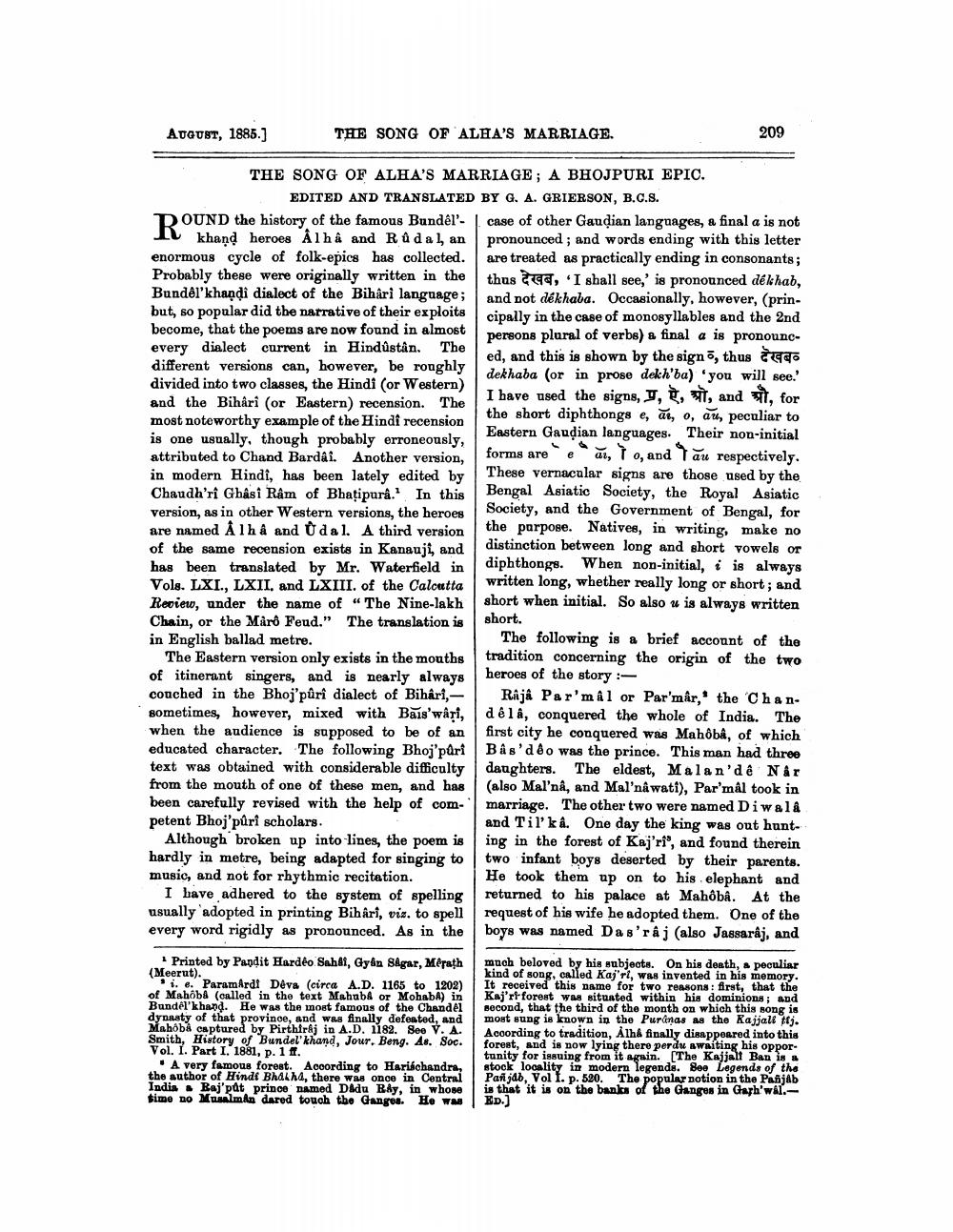________________
AUGUST, 1885.)
THE SONG OF ALHA'S MARRIAGE.
209
THE SONG OF ALHA'S MARRIAGE; A BHOJPURI EPIC.
EDITED AND TRANSLATED BY G. A. GRIERSON, B.C.S. D OUND the history of the famous Bundel'. case of other Gaudian languages, a final a is not
LU khand heroes Ålh å and Rûdal, an pronounced ; and words ending with this letter enormous cycle of folk-epics has collected are treated as practically ending in consonants; Probably these were originally written in the thus &c, I shall see,' is pronounced dékhab, Bundel'khandi dialect of the Bihari language;
and not dékhaba. Occasionally, however, (prinbut, so popular did the narrative of their exploits
cipally in the case of monosyllables and the 2nd become, that the poems are now found in almost
persons plural of verbs) a final a is pronouncevery dialect current in Hindústån. The
ed, and this is shown by the sign 7, thus doo different versions can, however, be roughly
dekhaba (or in prose dekh'ba) 'you will see.' divided into two classes, the Hindi (or Western) and the Bihari (or Eastern) recension. The
I have used the signs, J, T, 4, and , for
the short diphthongs e, ăi, o, au, peculiar to most noteworthy example of the Hindi recension
Eastern Gaudian languages. Their non-initial is one usually, though probably erroneously, attributed to Chand Bardái. Another version,
forms are e ar, 1 o, and Tau respectively. in modern Hindi, has been lately edited by
These vernacular signs are those used by the Chaudh'ri Ghâsi Râm of Bhatipura. In this
Bengal Asiatic Society, the Royal Asiatic version, as in other Western versions, the heroes Society, and the Government of Bengal, for are named Ålh å and Udal. A third version
the purpose. Natives, in writing, make no of the same recension exists in Kanauji, and
distinction between long and short vowels or has been translated by Mr. Waterfield in
diphthongs. When non-initial, i is always Vols. LXI., LXII. and LXIII. of the Calcutta
written long, whether really long or short; and Review, under the name of “The Nine-lakh
short when initial. So also u is always written Chain, or the Mårô Feud." The translation is
short. in English ballad metre.
The following is a brief account of the The Eastern version only exists in the mouths tradition concerning the origin of the two of itinerant singers, and is nearly always heroes of the story :couched in the Bhoj'půri dialect of Bihari, - Raja Par'mal or Par'mâr, the Chansometimes, however, mixed with Bais'wari, déla, conquered the whole of India. The when the audience is supposed to be of an first city he conquered was Mahôbá, of which educated character. The following Bhoj'puri | Bâs'dê o was the prince. This man had three text was obtained with considerable difficulty daughters. The eldest, Malan'da Nár from the mouth of one of these men, and has (also Mal'na, and Mal'nâwati), Parmál took in been carefully revised with the help of com- marriage. The other two were named Diwala petent Bhoj'púri scholars.
and Til'kâ. One day the king was out huntAlthough broken up into lines, the poem is ing in the forest of Kaj'ri', and found therein hardly in metre, being adapted for singing to two infant boys deserted by their parents. music, and not for rhythmic recitation.
He took them up on to his elephant and I have adhered to the system of spelling returned to his palace at Mahoba. At the usually 'adopted in printing Bihári, vis. to spell request of his wife he adopted them. One of the every word rigidly as pronounced. As in the boys was named Das'raj (also Jassaráj, and
Printed by Pandit Hardeo Sahal, Gyan Sagar, Merath (Meerut).
.i. e. ParamArdt Déva (circa A.D. 1165 to 1202) of Mahoba (called in the text Mahuba or MohabA) in Bundel'khand. He was the most famous of the Chandel dynasty of that province, and was finally defeated, and Mahoba captured by Pirthiraj in A.D. 1182. See V. A. Smith, History of Bundelkhand, Jour. Beng. As. Soc. Vol. 1. Part I. 1881, p. 11.
A very famous forest. According to Harischandra, the author of Hindi Bhalha, there was once in Central India Raj' pat prince named Dadu Bây, in whose time no MusalmAn dared touch the Ganges. He was
much beloved by his subjects. On his death, peculiar kind of song, called Kaj'ri, was invented in his memory. It received this name for two reasons: first, that the Kaj'ri forest was situated within his dominions and second, that the third of the month on which this song is most sung is known in the Purinas as the Rajjali tij. Acoording to tradition, Ålh& finally disappeared into this forest, and is now lying there perdu awaiting his oppor. tunity for issuing from it again. The Kajjalt Ban is s stock locality in modern legende. See Legends of the Panjab, Vol I. p. 520. The popular notion in the Pañjab is that it is on the banks of the Ganges in Graph'wal.ED.)




